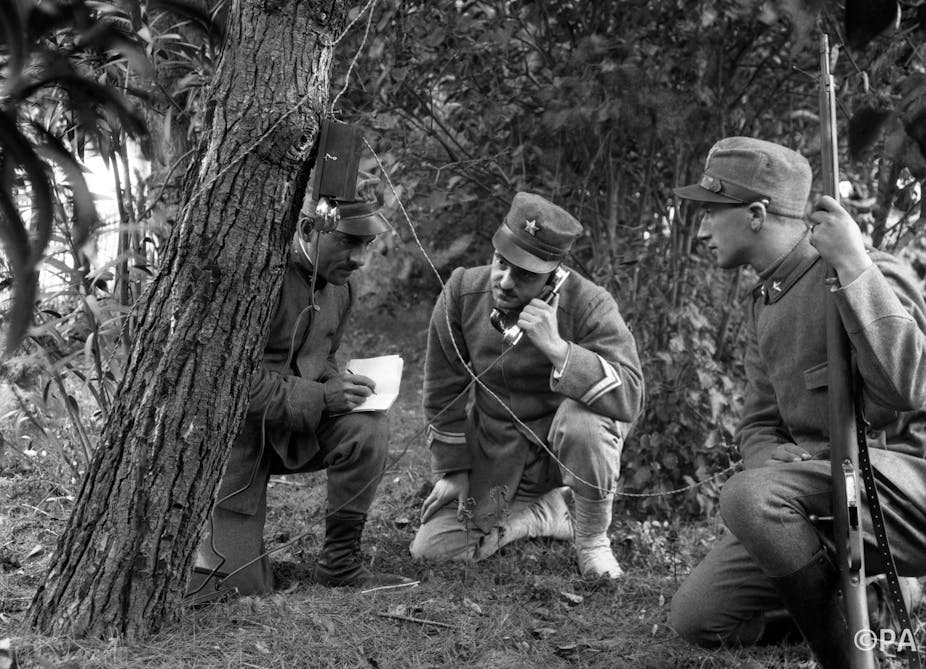When I received the tsunami of promotional gumph on BBC Radio 4’s cultural and technological blitzkrieg on the Great War, I have to confess I groaned. Tommies is one element of this package, a dramatisation of the years between 1914-18 currently on air that is set to conclude in 2018. The narrative is based on National Archives unit diaries for army battalions and divisions as well eye witness testimony from the Imperial War Museum.
Everyday humdrum is so punctured with the thought that 100 years ago this is what was going on at Mons, Ypres or the Marne. This is not mere representation of reality – Anybody fed up with the penchant for ultra-realistic fictional representations of violent conflict could call it an addition to the “war porn” genre. But would that be a fair accusation?
I have not seen the Brad Pitt film Fury, but I am reliably informed that it seeks to convey horror piled on more horror, ostensibly so that the audience can “experience” the reality.
But I have had no desire to experience the proud and utterly traumatising military tradition in my family. Great Uncle Tom lost his best friend, missed the first day of the Somme with influenza, was given a military cross for four years of trench warfare and spent the rest of his life screaming in nightmares through the early hours. My late father, John, lived through three months of the horrors of the Battle of Normandy in 1944. My mother and the rest of my family had to deal with the consequences.
When I spoke to veteran and poet Dennis Wilson, now 93, he gave me the most compassionate look of understanding and said the best day of his life was when two loads of shrapnel sent him home on July 1 1944: “To be there until September? I feel for what your father went through.”
In thoroughly un-heroic journalistic circumstances I once experienced a bombardment of Katyusha rockets. That was enough for me. Much better to continue my journalism career reviewing chocolate or radio programmes.
Without the framing of colour and the visual perspectives of horizon and gore, I think radio finds it very difficult to dramatise war action. This ends up being a good thing as much is left to the imagination.
Of course, the desire for authenticity in representing the World War I is challenged by the fact that it was not properly recorded in sound. The nearest we get to any idea of bombardment is a controversial 78 rpm phonograph record released in 1918 by His Master’s Voice. The question of whether it was faked is an enduring debate.
The creator of Tommies, Jonathan Ruffle, had a stroke of genius. He discovered that thousands of live shells are dug up by Belgian and French farmers every year and are then detonated in special ranges. So he was able to record what explosive ordnance actually sounded like.
He’s got up close and personal to the sheer horror, terror and weirdness of exploding metal and falling earth. And in true over-the-top educational saturation, the BBC has made available an online shell-shock guide on “the traumatic effects of war on those that survive it”.
I’ve found Tommies deeply upsetting to listen to – not in a way comparable to the reactions we’re supposed to have to Fury, or Saving Private Ryan. Tommies is much more personal, historical. This is undoubtedly a credit to the writing, directing and performances. The sound design is overwhelmingly impressive. The physics of sound mean that noise of the shell that blows you to pieces usually arrives after you have been eviscerated. You will survive if you can hear the shell going over your head instead of your ears lying on the ground disconnected from your cochlea.
So far the series does well in its focus on those who aren’t traditionally at the centre of such narratives. The focus has been on the signallers: communicators in uniform who risk their lives winning the battle of information gathering and then trying sending it to the right places.
And the central character is Sergeant Micky Bliss, who hails from the Signals Section of the Lahore Division in the Indian Army. This provides an interesting bridge to future episodes that explore the Indian story of the Western Front.
Hopefully the plot will lose its occasional tendency to melodrama and educate us, albeit dramatically, about the contribution of more than a million Indian soldiers who volunteered to fight thousands of miles from home.
So far Tommies, in its very long run for the next four years, looks like it will be an antidote to war, sympathetic and not exploitative of those who experienced it. Let’s hope it continues along this vein.

